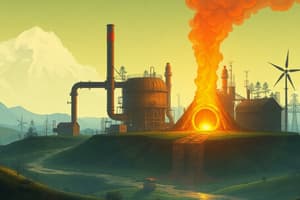Podcast
Questions and Answers
What is the primary outcome of the drying process in a gasifier?
What is the primary outcome of the drying process in a gasifier?
- Formation of charcoal
- Production of tar
- Release of carbon dioxide
- Loss of water from biomass (correct)
Which process occurs during the pyrolysis zone of biomass gasification?
Which process occurs during the pyrolysis zone of biomass gasification?
- Biomass is charring in the presence of air
- Charcoal is reduced to gases
- Large molecules break down into smaller molecules and char (correct)
- Water vapor is produced with no solid residue
What substance is primarily produced in the oxidation zone of a gasifier?
What substance is primarily produced in the oxidation zone of a gasifier?
- Carbon dioxide and water vapor (correct)
- Hydrogen
- Tar vapors
- Charcoal
At what temperature does biomass begin to rapidly decompose in the pyrolysis process?
At what temperature does biomass begin to rapidly decompose in the pyrolysis process?
What is produced as a result of the reduction zone in a gasifier?
What is produced as a result of the reduction zone in a gasifier?
Which of the following best describes pyrolysis?
Which of the following best describes pyrolysis?
What is the end product of the thermochemical conversion efficiency mentioned for the gasifier?
What is the end product of the thermochemical conversion efficiency mentioned for the gasifier?
Which component is NOT a product of the pyrolysis process?
Which component is NOT a product of the pyrolysis process?
What is the primary purpose of gasification in the context of biomass?
What is the primary purpose of gasification in the context of biomass?
Which of the following gases is NOT primarily produced during biomass gasification?
Which of the following gases is NOT primarily produced during biomass gasification?
In biomass gasification, what is the percentage of oxygen required compared to the stoichiometric air?
In biomass gasification, what is the percentage of oxygen required compared to the stoichiometric air?
What is the calorific value range of producer gas produced via biomass gasification?
What is the calorific value range of producer gas produced via biomass gasification?
What is the main component of producer gas produced through biomass gasification?
What is the main component of producer gas produced through biomass gasification?
Which statement best describes the combustion process in contrast to gasification?
Which statement best describes the combustion process in contrast to gasification?
Which of the following best describes the nature of the gasifier?
Which of the following best describes the nature of the gasifier?
What is a significant outcome of inadequate oxygen supply during biomass gasification?
What is a significant outcome of inadequate oxygen supply during biomass gasification?
What is the primary result of pyrolysis?
What is the primary result of pyrolysis?
Which statement best describes reduction in the context of gasification?
Which statement best describes reduction in the context of gasification?
What is a significant limitation of gasification using oxygen or air?
What is a significant limitation of gasification using oxygen or air?
Which of the following is the reverse process of combustion?
Which of the following is the reverse process of combustion?
In the water-gas reaction, what are the reactants?
In the water-gas reaction, what are the reactants?
What is the heat value range for syngas produced from gasification with oxygen or air?
What is the heat value range for syngas produced from gasification with oxygen or air?
Which reaction is categorized under reduction processes during gasification?
Which reaction is categorized under reduction processes during gasification?
Which of the following represent common products of pyrolysis?
Which of the following represent common products of pyrolysis?
Flashcards are hidden until you start studying
Study Notes
Biomass Gasification
- Biomass Gasification involves converting solid biomass to combustible gases like CO, H2, and CH4 through incomplete combustion
- Gasification is a thermo-chemical conversion process that produces syngas, a mixture of combustible gases
- In combustion: the fuel is converted into heat energy. In Gasification: fuel is converted into Syngas
Gasification Process
- Gasification occurs in a gasifier, which converts solid fuel into producer gas
- Producer gas has a calorific value of 950-1200 kcal/m3, while natural gas has a calorific value of 37.5-43.0 MJ/m3
- The primary components of producer gas are:
- Carbon Monoxide (13-19%)
- Hydrogen (18-22%)
- Carbon Dioxide (9-12%)
- Nitrogen (45-55%)
- Methane (1-5%)
- Water Vapour (4%)
- The gasification process has a thermochemical conversion efficiency of about 70%
Thermo-Chemical Process
- Biomass undergoes a series of thermo-chemical processes: drying, pyrolysis, oxidation, and reduction
- These processes result in the production of producer gas
- The thermo-chemical process is characterized by:
- Drying Zone: biomass is dried due to heat transfer from lower parts
- Biomass + Heat ⇢ Loss of water
- Pyrolysis Zone: biomass undergoes pyrolysis, breaking down into smaller molecules and char
- Biomass + Heat ⇢ Carbon + Gas (CO, CO2 ,H2 , H2O, CH4 , tar vapors)
- Oxidation Zone: air is introduced for combustion, which is exothermic and raises temperatures
- Reduction Zone: hot gases from the oxidation zone react with biomass, reducing CO2 to CO and H2
- 3C+2H2O+2CO2 +2H2 + Heat ⇢ 5CO+4H2 +H2O
- Drying Zone: biomass is dried due to heat transfer from lower parts
Pyrolysis
- Pyrolysis is the decomposition of biomass with heat in the absence of air/oxygen
- Biomass breaks down into charcoal, tar gases, and liquids
- Pyrolysis is characterized by forming CO2, CO, CH4, C2H4, H2O, char (C), and primary tar
Reduction
- Reduction strips oxygen atoms from combustion products, returning molecules to combustible forms
- Reduction is the reverse of combustion
- The heart of gasification is the reduction process
- Reduction in a gasifier occurs when CO2 or H2O pass through a bed of red-hot charcoal (C)
- Reduction reactions include:
- Water-gas reaction: C+H2O+118.5kJ/mol→CO+H2
- Methanation reaction: C+2H2→CH4+87.5kJ/mol
- Steam reforming methanation: CH4+H2O+206kJ/mol→CO+3H2
- Boudouard reaction: C+CO2+159.9kJ/mol→2CO
- Reverse water-gas shift reaction: CO2+H2+41.2kJ/mol→H2O+CO
Limitations of Producer Gas
- Producer gas has a low heating value (4-6 MJ/m3) due to a large proportion of nitrogen (30-60%) and CO2 (10-15%)
- This limits its use in applications requiring high temperatures and steady operation
Studying That Suits You
Use AI to generate personalized quizzes and flashcards to suit your learning preferences.




